Digital Financial Literacy
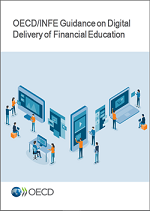 |
OECD/INFE Guidance on Digital Delivery of Financial EducationInnovative uses of digital technologies in the delivery of financial education can serve multiple complementary objectives and effectively support the building blocks of financial education. This Guidance was developed to assist policy makers in deciding when to adopt digital delivery, and how to effectively design and implement digital financial education initiatives, by offering non-binding actionable directions. It builds on the work undertaken by the OECD and its International Network on Financial Education, including the G20/OECD-INFE Policy Guidance Note on Digitalisation and Financial Literacy and international comparative analyses on how public authorities design, deliver and evaluate digital financial education initiatives, notably in the context of the COVID-19 pandemic. Date of publication: 22 April 2022 |
|
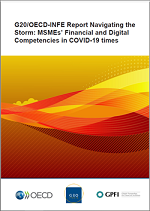 |
G20/OECD-INFE Report on Navigating the Storm: MSMEs’ Financial and Digital Competencies in COVID-19 timesThe OECD prepared this report in support of the agenda of the G20 Global Partnership on Financial Inclusion (GPFI) under the G20 Italy Presidency 2021, as well as part of the work of the OECD International Network on Financial Education (OECD/INFE). It analyses the relationship between MSMEs’ financial literacy, digitalisation and impact of the COVID-19 crisis. The report relies on a dedicated data collection exercise promoted by the G20 Italy Presidency in 2021, using the OECD/INFE 2020 survey instrument to measure the financial literacy of MSMEs. Fourteen G20 and non-G20 members participated in the data collection on a voluntary basis, including the following G20 countries: Brazil, China, France, Germany, Italy, Mexico, Russia, Saudi Arabia, Turkey; and the following non-G20 countries: Georgia, the Netherlands, Peru, Portugal, Spain. The report reflects inputs and guidance from GPFI member countries and members of the OECD/INFE. Download the report (available in English and French) Date of publication: 28 October 2021 |
|
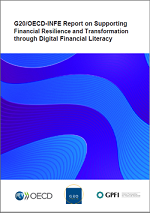 |
G20/OECD-INFE Report on Supporting Financial Resilience and Transformation through Digital Financial LiteracyThis report discusses the concept of financial resilience and its relationship with financial inclusion, financial literacy and financial well-being. It offers a wide range of case studies looking at the role of digital financial education initiatives addressing financial resilience and vulnerability. It proposes set of effective approaches describing how the digital financial education programmes can support individual financial resilience and long-term well-being. The effective approaches complement the provisions of the OECD Council Recommendation on Financial Literacy, which was welcomed by G20 Finance Ministers and Central Bank Governors on 9-10 July 2021. The effective approaches and lessons learnt presented in this report have provided input for the development of the G20 Menu of Policy Options for digital financial literacy and financial consumer and MSME protection “Enhancing digital financial inclusion beyond the COVID-19 crisis” developed by the GPFI. This report was prepared in support of the agenda of the G20 Global Partnership on Financial Inclusion (GPFI) under the G20 Italy Presidency 2021, as well as part of the work of the OECD International Network on Financial Education (OECD/INFE). The report reflects inputs and guidance from GPFI member countries, Implementing Partners, Affiliated Partners and other key stakeholders, and particularly members of the OECD/INFE, via an extensive consultation process. Date of publication: 5 September 2021 |
|
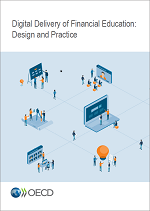 |
Digital Delivery of Financial Education: Design and PracticeThe importance of the digital delivery of financial education is growing in parallel with the digitalisation of our societies and economies. Individuals increasingly make use of digital technology in their lives and expect higher levels of personalisation and easier access to content. Digitalisation is potentially enabling public authorities to reach wider audiences and increase the impact of their financial literacy programmes and policies. The measures implemented to contain the COVID-19 pandemic have made the role played by digital tools even more relevant - and often necessary - to help ensure that all target audiences, in particular those most affected by the economic consequences of the crisis, have access to financial literacy resources. It is now more important than ever to ensure that the innovative use of digital technologies in the field of financial education effectively contributes to increasing financial resilience and well-being, and that governments design and implement effective digital financial education initiatives. This report, building on over 70 case studies from members of the OECD International Network on Financial Education, contributes to a better understanding of how public authorities worldwide are designing, delivering and evaluating digital financial education initiatives, and prepares forthcoming work on the development of high-level international guidance on the digital delivery of financial education. Download the report (available in English and French) Date of publication: 19 January 2021 |
|
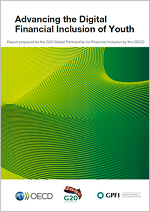 |
Advancing the Digital Financial Inclusion of YouthThis report on has been prepared for the G20/GPFI by the OECD under the Saudi Presidency in 2020. The focus on youth reflects the fact that almost half of the world's 1.2bn young people aged between 15-24 remain unbanked. The report examines the factors that contribute to youth financial inclusion and the role of digital financial services in meeting young people’s financial needs. It then explores opportunities and challenges relating to advancing youth digital financial inclusion. The report sets out a range of options for policy makers based on data, research and country approaches, to help advance the appropriate and safe digital financial inclusion of young people, including ensuring appropriate financial consumer protection and financial education. These policy options form part of the basis for the G20 High Level Policy Guidelines on Digital Financial Inclusion for Youth, Women and SMEs. Advancing the Digital Financial Inclusion of Youth reflects inputs and guidance from GPFI member countries, Implementing Partners, Affiliated Partners and other key stakeholders, particularly members of the G20/OECD Task Force on Financial Consumer Protection, FinCoNet, the OECD/International Network on Financial Education, the Arab Monetary Fund and the Alliance for Financial Inclusion, via an extensive consultation process. Date of publication: 21 July 2020 |
|
 |
Personal Data Use in Financial Services and the Role of Financial Education: A Consumer-centric AnalysisTechnological innovations have greatly increased the capacity of financial services providers to capture, store, combine and analyse a wide variety of customer data, such as their financial situation, preferences, habits and physical location. These trends can bring benefits to consumers, but come with new risks specific to the financial services sector that may require a comprehensive policy response. Positive outcomes include potentially cheaper and more relevant financial products and access to credit for those without any traditional credit record. In parallel, consumers may not be aware of the extent to which their data is being used. For example, consumers may risk marginalisation as a result of opaque and potentially unfair data-mining practices, or find themselves exposed to fraud and cybercrime. This report reviews the risks and benefits of these technological developments and suggests policy options to protect consumers, combining robust financial and personal data protection and greater consumer awareness and financial education. It was developed as part of the programme of work of the OECD International Network on Financial Education’s (INFE) Working Group on Digital Financial Literacy. Download the report (available in English and French) Date of publication: 23 March 2020 |
|
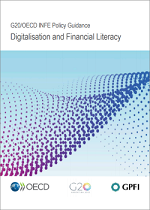 |
G20/OECD-INFE Policy Guidance on Digital Financial LiteracyThe digitalisation of financial products and services, and the consequent need to strengthen digital financial literacy has become an important component of the global policy-making agenda. This guidance aims to identify and promote effective initiatives that enhance digital and financial literacy in light of the unique characteristics, advantages, and risks of digital financial services and channels. This policy guidance contributed to the Argentinian G20 presidency’s financial inclusion agenda and is for consideration by policy makers responsible for the implementation and application of key elements of the OECD/INFE High-level Principles on National Strategies for Financial Education, the G20 Principles for Innovative Financial Inclusion and the G20 High-level Principles on Digital Financial Inclusion, with respect to principle 6. Download the policy guidance (available in English and French) Date of publication: 28 July 2018 |
|
|
|
Related Documents

